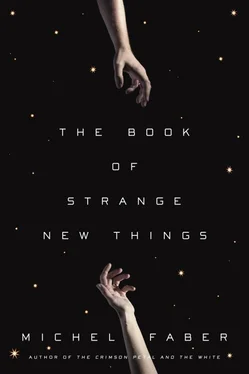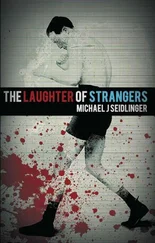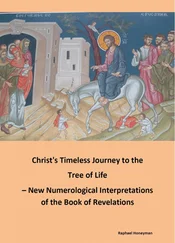All have sinned, and come short of the glory of God . That was one of the main verses that had saved him, in the end: one of those Bible soundbites that everybody knows but nobody really understands until they’re going down for the last time, choking to death on their own filth.
He sprinkled talcum powder in the clefts of his groin, which were a little sore. His scrotum had a few small scabs on the tender flesh — from scratching, obviously, although he couldn’t remember breaking the skin. The scabs were dark and clean. Within a day or two, they would vanish. The tops of his ears and the furrows of his brow would shed feathery shreds of white epidermis, revealing hard fresh pink underneath. His concave stomach would fill out, if he ate a few hearty meals. The fungal growth between his toes would clear up after a few applications of the lotion Grainger had given him. The pads of oedema in his knees and ankles would shrink away.
If Bea saw him right now, she might be alarmed at the state he was in. She hated to see his skin broken; she would fuss over the merest scratch on his hand, insist on putting Band-Aids on cuts that would be half-healed by the evening. One of her favourite places to kiss him was on his fingertips, whenever he’d bitten a nail to the quick. She’d have plenty to kiss at the moment.
He had not yet written to her. There were at least twenty-five messages banked up. Three or four had arrived in the last few hours, since Bea had calculated he must be back. He was not ready to face her, not even through the veil of the written word. He needed to reacclimatise to life outside the Oasan settlement. He needed to adjust to the complicated trivia of human intercourse.
‘So, how were the folks in Freaktown?’
Tuska was smiling broadly, to show he meant no offence. His beard was quite thick by now, mostly grey, which made him look older, and his neck was red from scratching where the wiry hairs tickled his skin. Peter could tell at a glance that the beard’s days were numbered: Tuska would shave it off very soon. Why did humans have this compulsion to change their outward appearance, only to revert to what suited them? What on earth was the point?
‘Uh… they were fine,’ he replied, a few seconds too late. ‘They’re good people.’
‘Yeah?’ said Tuska. ‘How can you tell?’
They were sitting at a table in the USIC mess hall. Tuska was tucking into spaghetti Bolognese (whiteflower spaghetti, whiteflower ‘mince’, imported tomato sauce, imported herbs) and Peter was eating a pancake (100 % local). The air was full of noises: the sound of rain pelting rhythmically against the windows, the mingled conversations of other employees, the clattering of meal trays, the scraping of chairs, the opening and shutting of doors, and Frank Sinatra crooning ‘My Funny Valentine’. It all seemed a grossly excessive amount of bustle and chatter to Peter, but he knew the problem was his perception, and he must try to get in the swing of it. The metaphorical swing, that is: no amount of effort could reconcile him to Frank Sinatra.
A pair of fingers clicked near his face. ‘Peter, are you with us?’ said Tuska.
‘Sorry. I really dislike this kind of music.’
It was an evasive answer, but also true. Sinatra’s self-congratulatory gargle, amplified to be audible over the din, was nudging him across a threshold of tolerance, like repeated pokes in the ribs from a prankster.
‘I can live with it,’ shrugged Tuska. ‘It’s just ripples in the airwaves, Peter. Molecules getting excited for a few seconds and then settling down again. Nothing to get riled about.’
‘ Each day is Valentine’s day ,’ smarmed Sinatra, as Tuska assembled another forkload of spaghetti.
‘Somebody dissing Ol’ Blue Eyes?’ A woman who’d been seated at a nearby table sidled over, carrying her dessert bowl. She was a colleague of BG’s: they had a similar physique, although this woman was white and blonde. She levelled a mock-censorious stare at Peter. ‘Did I hear you blaspheming against the godlike Frank?’
‘I’m sorry,’ he said. ‘I should know better.’
‘The consummate American songbook,’ she informed him, deadpan. ‘Never equalled. One of the great achievements of humankind.’
Peter nodded humbly. ‘Maybe I’m the wrong age to appreciate it.’
‘How old are you?’
‘Thirty-three.’
‘I’m thirty-two!’
‘Well, I’m English, that’s another thing… ’
‘Al Bowlly, Noël Coward, Shirley Bassey?’ She spoke the names as though any British-born person would swell with pride to hear them.
‘Oh dear,’ sighed Peter. ‘I’m… uh… out of my depth here.’
There was a pause, during which Frank Sinatra launched into a ditty about a little old ant and a rubber tree plant. ‘It’s OK,’ said the woman, indulgently. ‘It’s OK. Not everyone likes the same things. It’s allowed.’
He remembered her name now: Iris. Iris Berns. She came from a Pentecostal family and was an atheist. She liked to play card games, she once had a sister who drowned in a back-yard swimming pool, she had a running joke with BG about centrifugal force, and she was heterosexual despite her butch appearance. None of these bits of information quite fitted into any sensible remark Peter could think of making at this point. Even calling her Iris might come across as an attempt to show off something he’d recalled too late, and anyway, she might want him to call her Berns like everybody else.
Why was even the shallowest human conversation so fraught with pitfalls and tricky calibrations? Why couldn’t people just keep silent until they had something essential to say, like the Oasans?
‘Give him a break,’ said Tuska. ‘He’s just come back from a long spell in Freaktown.’
‘Yeah?’ said Berns, plonking down her dessert and taking a seat at the table. ‘You should take some suntan lotion next time.’
‘I’ll do that,’ said Peter. He was aware that he was more red-faced than he needed to be, because he’d foolishly worn a sweater over his T-shirt. It had seemed a good idea at the time: a signal that he was a regular urban guy, not some freaky desert-dweller.
‘I’m surprised you got so much sun,’ said Berns, stirring a dollop of dark red syrup through the yoghurt-like substance in her bowl until the white turned pink. ‘They’re not exactly outdoors types, are they?’
Peter pulled the neck of his sweater down, to let air in. ‘They work outside almost every day,’ he said.
‘Yeah?’
‘Yes.’
‘Doing what?’
‘Growing and harvesting food for us.’
Berns ate a few spoonfuls of dessert. ‘You know, I’ve driven all the way round that settlement, and I never saw a plantation, greenhouses, nothing.’
‘That’s because they’re right in the centre.’
‘The centre?’
‘Of the settlement.’ Peter took a deep breath. His forehead stung with perspiration. ‘Haven’t we been through this already?’
‘Must’ve been with a different woman, honey.’
‘Don’t call him honey,’ said Tuska. ‘He’s a preacher.’
‘The fields are inside the settlement,’ Peter explained. ‘The buildings are built in a circle around them.’
‘It figures,’ said Berns.
‘Figures? Why?’
‘They’re real secretive.’
Peter wiped his brow with his sleeve. ‘It’s not because… ’ His voice was too soft. A flotilla of children had come along to assist Sinatra on the chorus of ‘High Hopes’. Peter’s motivation to explain the Oasans’ relationship with agriculture faltered under their assault.
Berns stood up and called across the room: ‘Hey, Stanko! Can we have something instrumental? Our pastor here is having difficulty!’
Читать дальше












